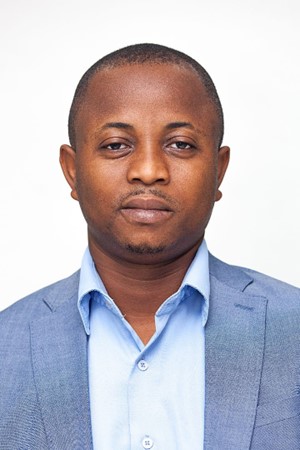
… speaks on the Centre’s new identity
Component Manager at the Ghanaian European Centre for Jobs, Migration and Development (GEC), Kwaku Yeboah has reiterated the Centre’s readiness to support individuals through its services and to expose them to opportunities here in Ghana, within the West African region, Germany, and Europe at large, in the quest to address labour challenges and improve lives.
This is in line with the Centre’s aim to provide counselling and information on labour market demands in the country and beyond as well as opportunities in regular labour migration.
Mr. Yeboah noted that the Centre, which is an outgrowth of the Ghanaian-German Centre for Jobs, Migration and Reintegration has provided over 70,000 counseling measures and over 40 active labour market measures since 2017 through short-term TVET trainings, job placements, business set-up, counselling and psycho-social support.
“This includes people who have received counselling sessions, benefited from economic startup programmes, vocational and technical training like hairdressing, tailoring and catering. Also, through the Ghana job fairs, almost 6000 people have been placed into direct employment, including internship opportunities through which people are now working permanently. The Centre has also provided over 10000 business startup support for the youth, including reintegration measures, mental health and psychosocial counseling, whilst providing much needed institutional support for the Labour Department of the partner Ministry of Employment and Labour Relations,” he said.
As unemployment remain a major challenge in the country especially in the light of the current economic challenges, he said the Centre is best positioned to bridge the existing information gap as well as build capacities of individual who wish to take advantage of regular migration opportunities in partner countries such as Germany and the broader EU. This he believes, provides a triple win for all stakeholders, including the individuals, their host countries and Ghana through remittances and enhanced skills transfer, through the partnership of the German Ministry of Economic Cooperation and Development (BMZ), the European Union and the Ministry of Employment and Labour Relations.
He noted that the: “Ghanaian European Centre stands ready to support as many prepared individuals as possible through its counseling services and to expose them to opportunities here in Ghana, within the region and outside the shores of Ghana particularly the EU for them to take advantage where appropriate, for the improvement of lives which will ultimately lead to improving the Ghanaian society. But also, to help address the labour challenges through our partners, Germany and EU.” r
Early this year the European Union (EU) Delegation launched a strengthened cooperation with the Embassy of Germany and the Ministry of Employment and Labour Relations through the opening of the Ghanaian-European Centre for Jobs, Migration and Development (GEC).
The three parties joined forces to boost a more holistic approach to migration, oriented towards development and job creation.
Mr. Yeboah speaks on the GEC’s new identity:
B&FT: What is the Ghanaian-European Centre and what do you do?
Response: The Ghanaian-European Centre is under the global project Centres for Migration and Development (ZME). In Ghana, though the Centre has been in existence since 2017, the current phase is a new enhanced approach with support from the European Union.
What we do is in four considerations and includes offering regular migration advisory services, regional labour mobility advisory support is one of the main components because we have the EU coming on board to support what do thus broadening the services, we provide through the entire EU bloc. Within that component is also a package for sub-regional labour mobility opportunities.
Another key thing we do is capacity building. We work with the Labour Department (spearheading employment promotion) to build the capacity of the many people who are looking for jobs through skills training, career guidance and jobs and career fairs, to bring together employees and employers. This year we are doing a mega career fair and the idea is to help provide job seekers the requisite information to help them look for opportunities either in Ghana, Germany, or Europe, if they qualify. We also provide psychosocial and economic reintegration support for returning migrants.
B&FT: What are some of the offers and packages under the new Centre?
The GEC will offer information and advice on prerequisites for regular labour and education opportunities in Europe and West Africa; social and economic reintegration for returnees; Capacity building support to the Ministry of Employment and Labour Relations in its employment promotion measures and labour market interventions for vulnerable groups in Ghana.
B&FT: How different is the Ghanaian-European Centre from the Ghanaian-German Centre?
Response: The Ghanaian-European Centre is an outgrowth of the Ghanaian-German Centre. The EU has come on board to support the efforts of the Centre to widen the scope and provide even more enhanced services to our clients. So instead of mainly focusing on Ghanaians largely coming from Germany, now we also focus on providing support for returning Ghanaian migrants and for employment and educational prospects within the broader EU.
B&FT: What are some of the skilled areas needed in Germany? How can skilled persons take advantage of Germany’s need for skilled labour
Response: Largely there is skills shortage in Germany in areas like Engineering, IT, TVET areas, the construction sector, health care and the hospitality sector. There are significant opportunities in Germany and that is what they are making available to the global community.
Ghana has a lot of well-trained but unfortunately, unemployed people as schools churn out about 30,000 graduates every year, so this is a window of opportunity, and I am talking about graduate unemployed persons and the underemployed. This opportunity is to complement the effort of the government in providing a much broader environment for employment and educational considerations and to also acquire cutting-edge skills that are required in Ghana.
B&FT: Thank you.
The re-branding of the Centre – together with the broader services provided – is at the core of a larger EU-German collaboration through the EU-Ghana partnership for jobs, migration and development programme.









